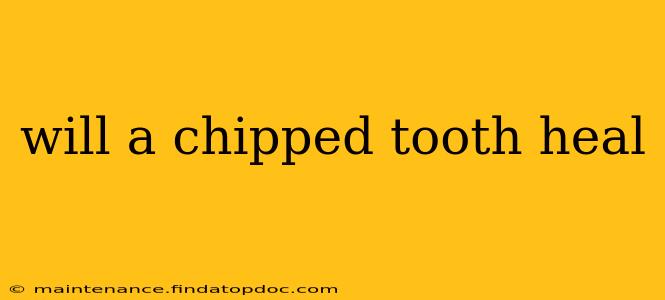A chipped tooth is a common dental injury, often caused by accidents, falls, or impacts. While a chipped tooth won't "heal" in the same way a broken bone does, the body does initiate a natural repair process. However, this process is limited, and complete regeneration of the tooth structure isn't possible. This article explores the healing process, treatment options, and answers frequently asked questions surrounding chipped teeth.
What Happens When a Tooth Chips?
When a tooth chips, the enamel and possibly the dentin (the underlying layer) are damaged. The extent of the damage determines the severity and the necessary treatment. A small, superficial chip may require little to no intervention, while a larger chip exposing the pulp (the soft inner part of the tooth containing nerves and blood vessels) requires immediate dental attention to prevent infection.
Can a Chipped Tooth Heal on Its Own?
No, a chipped tooth will not heal itself. While the body might initiate a minor repair process by forming a protective layer of dentin, this doesn't restore the lost tooth structure. The chip will remain, and without intervention, it could lead to further problems such as:
- Increased sensitivity: Exposure of dentin makes the tooth more sensitive to hot and cold temperatures, and sweet or acidic foods.
- Infection: A deep chip exposing the pulp can lead to infection and potentially an abscess, which requires root canal treatment.
- Fracture: A small chip can worsen over time, potentially leading to a more significant fracture.
- Aesthetic concerns: A visible chip can impact the appearance of your smile.
What are the Treatment Options for a Chipped Tooth?
The treatment for a chipped tooth depends on the severity of the damage. Common treatment options include:
- No treatment: For very minor chips that don't cause sensitivity or aesthetic concerns, no treatment might be necessary.
- Dental bonding: This is a cosmetic procedure where a tooth-colored resin is applied to the chipped area, sculpted to match the surrounding tooth, and hardened with a special light. Bonding is a relatively quick and affordable option for small chips.
- Dental veneers: These are thin, custom-made shells that cover the front surface of the tooth. Veneers are a more durable and long-lasting option than bonding, especially for larger chips or significant aesthetic concerns.
- Crowns: A crown is a cap that completely covers the tooth. Crowns are usually recommended for teeth with significant damage or structural compromise.
- Root canal treatment: If the chip exposes the pulp and causes an infection, a root canal is necessary to remove the infected tissue and save the tooth.
How Long Does it Take for a Chipped Tooth to Heal (or be Repaired)?
It's crucial to understand that the tooth itself won't heal. The "healing" process refers to the dental repair. The timeframe varies depending on the chosen treatment:
- Bonding: Typically completed in a single appointment.
- Veneers: Requires multiple appointments for preparation and placement. The entire process can take a few weeks.
- Crowns: Requires multiple appointments for preparation, impression taking, and placement. The process can take several weeks.
- Root canal: Requires multiple appointments and can take several weeks or months, depending on the complexity of the case.
Does a Chipped Tooth Affect the Bite?
A significant chip can alter the way your teeth fit together, affecting your bite. This can lead to discomfort, jaw pain, and even damage to other teeth. Your dentist will evaluate your bite during the assessment and may recommend treatment adjustments to restore proper occlusion (the way your teeth come together).
Can a Chipped Tooth Cause Problems Later?
Yes, a neglected chipped tooth can lead to various problems, including increased sensitivity, infection, further fracture, and aesthetic concerns. Prompt treatment is essential to prevent these complications. Regular dental check-ups are crucial for early detection and treatment of any dental issues.
What Should I Do If I Chip a Tooth?
If you chip a tooth, seek immediate dental attention. In the meantime:
- Rinse your mouth with warm salt water.
- Apply a cold compress to the area to reduce swelling.
- Save any broken pieces of the tooth in milk or saline solution. This might be useful for the dentist.
- Avoid eating hard or crunchy foods.
Remember, prompt treatment is key to preserving the health and appearance of your smile. Don't hesitate to contact your dentist if you experience any discomfort or notice a chip in your tooth.
